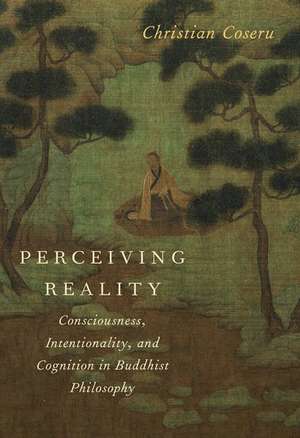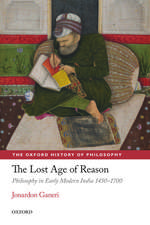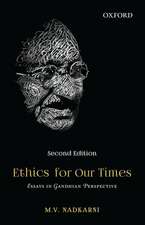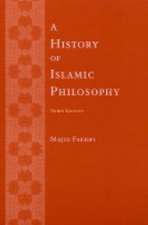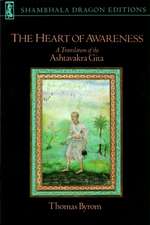Perceiving Reality: Consciousness, Intentionality, and Cognition in Buddhist Philosophy
Autor Christian Coseruen Limba Engleză Paperback – 23 iul 2015
| Toate formatele și edițiile | Preț | Express |
|---|---|---|
| Paperback (1) | 298.08 lei 31-37 zile | |
| Oxford University Press – 23 iul 2015 | 298.08 lei 31-37 zile | |
| Hardback (1) | 631.73 lei 31-37 zile | |
| Oxford University Press – 18 oct 2012 | 631.73 lei 31-37 zile |
Preț: 298.08 lei
Nou
Puncte Express: 447
Preț estimativ în valută:
57.03€ • 59.56$ • 47.10£
57.03€ • 59.56$ • 47.10£
Carte tipărită la comandă
Livrare economică 04-10 aprilie
Preluare comenzi: 021 569.72.76
Specificații
ISBN-13: 9780190253110
ISBN-10: 0190253118
Pagini: 384
Dimensiuni: 163 x 241 x 33 mm
Greutate: 0.68 kg
Editura: Oxford University Press
Colecția OUP USA
Locul publicării:New York, United States
ISBN-10: 0190253118
Pagini: 384
Dimensiuni: 163 x 241 x 33 mm
Greutate: 0.68 kg
Editura: Oxford University Press
Colecția OUP USA
Locul publicării:New York, United States
Recenzii
A well-crafted and important work, a work that will without doubt influence the discussion of Buddhist epistemology, and the analysis of the relation between Buddhist thought and phenomenology for years to come.
This excellent book takes cross-cultural philosophy to a new high point by combining Indian Buddhist philosophy with Western phenomenology and philosophy of mind. Offering a rich account of perceptual consciousness, Coseru also casts new light on attention, sensation, self-awareness, and conceptualization. Philosophers of mind and Buddhist scholars alike will find many new insights throughout this groundbreaking book.
Perceiving Reality is a masterful study of Buddhist epistemology. It is first and foremost a substantial contribution to the philosophical literature, developing a compelling account of epistemic authority in the context of the phenomenology of perception. It is also an excellent study of Indian Buddhist epistemological inquiry. The philology is impeccable. But it is always in the service of philosophy. Philosophers and Buddhologists must pay attention to Coseru's book.
Perceiving Reality is a sophisticated defense of phenomenological naturalism in the philosophy of mind. A striking feature of this book is the outstanding re-descriptions of Indian Buddhist theory in a vibrant contemporary language, testament to the great dexterity with which Coseru moves in the thought-worlds of both classical Buddhism and contemporary phenomenology. Essential reading in the case it makes for comparative philosophy of mind; in particular, the significance of Indian Buddhist analysis in modern discussions of intentionality, self-consciousness, and conceptual content.
In both the breadth of his study and the important questions it raises, Coseru's work accomplishes a great deal. It will find an important place in the study of Buddhist philosophy.
The insights of [Coseru's] phenomenological interpretation of Buddhist theories of perception and self-awareness allow these ancient ideas to become live options for current debates in the philosophy of mind. Moreover, the ample references to empirical research lay the groundwork for further Buddhist engagement with the scientific study of consciousness and cognition.
This excellent book takes cross-cultural philosophy to a new high point by combining Indian Buddhist philosophy with Western phenomenology and philosophy of mind. Offering a rich account of perceptual consciousness, Coseru also casts new light on attention, sensation, self-awareness, and conceptualization. Philosophers of mind and Buddhist scholars alike will find many new insights throughout this groundbreaking book.
Perceiving Reality is a masterful study of Buddhist epistemology. It is first and foremost a substantial contribution to the philosophical literature, developing a compelling account of epistemic authority in the context of the phenomenology of perception. It is also an excellent study of Indian Buddhist epistemological inquiry. The philology is impeccable. But it is always in the service of philosophy. Philosophers and Buddhologists must pay attention to Coseru's book.
Perceiving Reality is a sophisticated defense of phenomenological naturalism in the philosophy of mind. A striking feature of this book is the outstanding re-descriptions of Indian Buddhist theory in a vibrant contemporary language, testament to the great dexterity with which Coseru moves in the thought-worlds of both classical Buddhism and contemporary phenomenology. Essential reading in the case it makes for comparative philosophy of mind; in particular, the significance of Indian Buddhist analysis in modern discussions of intentionality, self-consciousness, and conceptual content.
In both the breadth of his study and the important questions it raises, Coseru's work accomplishes a great deal. It will find an important place in the study of Buddhist philosophy.
The insights of [Coseru's] phenomenological interpretation of Buddhist theories of perception and self-awareness allow these ancient ideas to become live options for current debates in the philosophy of mind. Moreover, the ample references to empirical research lay the groundwork for further Buddhist engagement with the scientific study of consciousness and cognition.
Notă biografică
Christian Coseru is Associate Professor of Philosophy in the Department of Philosophy at the College of Charleston
